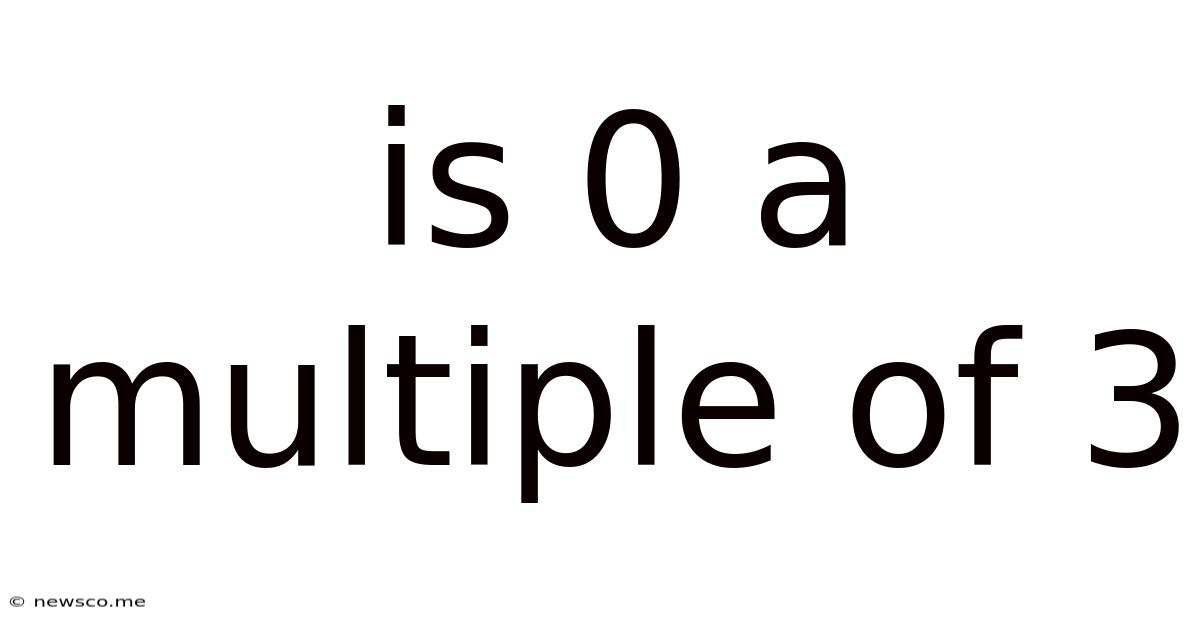Is 0 A Multiple Of 3
News Co
Apr 06, 2025 · 5 min read

Table of Contents
Is 0 a Multiple of 3? A Deep Dive into Divisibility and Number Theory
The question, "Is 0 a multiple of 3?" might seem trivial at first glance. After all, zero is often associated with nothingness. However, delving into the mathematical definition of multiples and exploring the properties of zero reveals a surprisingly rich and nuanced answer. This article will not only definitively answer the question but also explore the underlying concepts of divisibility and number theory, providing a comprehensive understanding for both beginners and those seeking a deeper appreciation of mathematical principles.
Understanding Multiples and Divisibility
Before tackling the central question, let's establish a clear understanding of key mathematical terms.
What is a Multiple?
A multiple of a number is the result of multiplying that number by any integer (a whole number, including negative numbers and zero). For instance, the multiples of 3 are: …, -9, -6, -3, 0, 3, 6, 9, … Notice that this sequence extends infinitely in both positive and negative directions.
What is Divisibility?
Divisibility refers to the ability of one number to be divided evenly by another number, without leaving a remainder. If a is divisible by b, then there exists an integer k such that a = bk. In simpler terms, b is a factor of a.
Exploring the Case of Zero
The number zero holds a unique position in mathematics. It's neither positive nor negative, and it plays a crucial role in many arithmetic operations. Its behavior with respect to multiples and divisibility requires careful consideration.
Zero as a Multiple
Let's consider the definition of a multiple: a multiple of a number n is any number that can be expressed as n multiplied by an integer. If we take n = 3, we can represent multiples of 3 as 3k, where k is any integer.
Let's explore a few values of k:
- k = 1: 3 * 1 = 3
- k = 2: 3 * 2 = 6
- k = 0: 3 * 0 = 0
- k = -1: 3 * -1 = -3
- k = -2: 3 * -2 = -6
As demonstrated, when k = 0, the result is 0. Therefore, zero satisfies the definition of being a multiple of 3.
Zero and Divisibility Rules
Most divisibility rules focus on determining whether a number is divisible by a specific number based on its digits. While these rules are helpful for larger numbers, they don't always directly address the case of zero.
However, the fundamental definition of divisibility still holds. If a number a is divisible by a number b, then there exists an integer k such that a = bk. In the case of 0 being divisible by 3, we can write:
0 = 3 * 0
Since 0 is an integer, the condition for divisibility is met. Thus, 0 is divisible by 3.
The Significance of Zero in Mathematical Operations
Zero's unique properties are crucial in various mathematical contexts:
- Additive Identity: Zero is the additive identity, meaning that adding zero to any number does not change its value. This property is fundamental to arithmetic.
- Multiplicative Property: Multiplying any number by zero always results in zero. This property is essential in algebra and calculus.
- Division by Zero: Division by zero is undefined. This is because there's no number that, when multiplied by zero, results in a non-zero value. This limitation is often a source of confusion but is crucial for maintaining the consistency of mathematical systems.
Addressing Common Misconceptions
Some may mistakenly believe that since zero represents "nothing," it cannot be a multiple of any number. However, this is incorrect. Multiples relate to the result of multiplication, and 0 is a valid outcome of multiplying 3 by 0.
Conclusion: Yes, 0 is a Multiple of 3
Based on the formal definition of multiples and divisibility, and the unique properties of zero, the answer is a resounding yes. Zero is indeed a multiple of 3 (and of every other integer except zero itself). This understanding isn't merely an academic curiosity; it highlights the importance of precise definitions and rigorous logic in mathematics. The seemingly simple question of whether 0 is a multiple of 3 opens doors to exploring deeper concepts in number theory and solidifies our understanding of the fundamental building blocks of mathematics.
Further Exploration: Beyond the Basics
This exploration into the multiples of 3 and the special case of zero can lead to broader mathematical inquiries. Consider the following extensions:
- Multiples of other numbers: Investigating whether zero is a multiple of other integers. The conclusion remains consistent: zero is a multiple of all integers except zero itself.
- Modular Arithmetic: Explore how zero behaves in modular arithmetic, which deals with remainders after division. Zero is congruent to zero modulo any integer.
- Abstract Algebra: Investigate the concept of zero in more abstract algebraic structures, where it often represents the additive identity element.
By exploring these advanced topics, you can develop a more profound appreciation for the elegance and consistency of the mathematical framework. The deceptively simple question, "Is 0 a multiple of 3?" serves as a gateway to a deeper understanding of fundamental mathematical principles. It demonstrates that even seemingly simple concepts can lead to insightful explorations of the rich and fascinating world of numbers. The journey from basic arithmetic to advanced number theory is a testament to the power and beauty of mathematical investigation. Embrace the curiosity, delve deeper, and unlock the wonders of mathematics!
Latest Posts
Related Post
Thank you for visiting our website which covers about Is 0 A Multiple Of 3 . We hope the information provided has been useful to you. Feel free to contact us if you have any questions or need further assistance. See you next time and don't miss to bookmark.